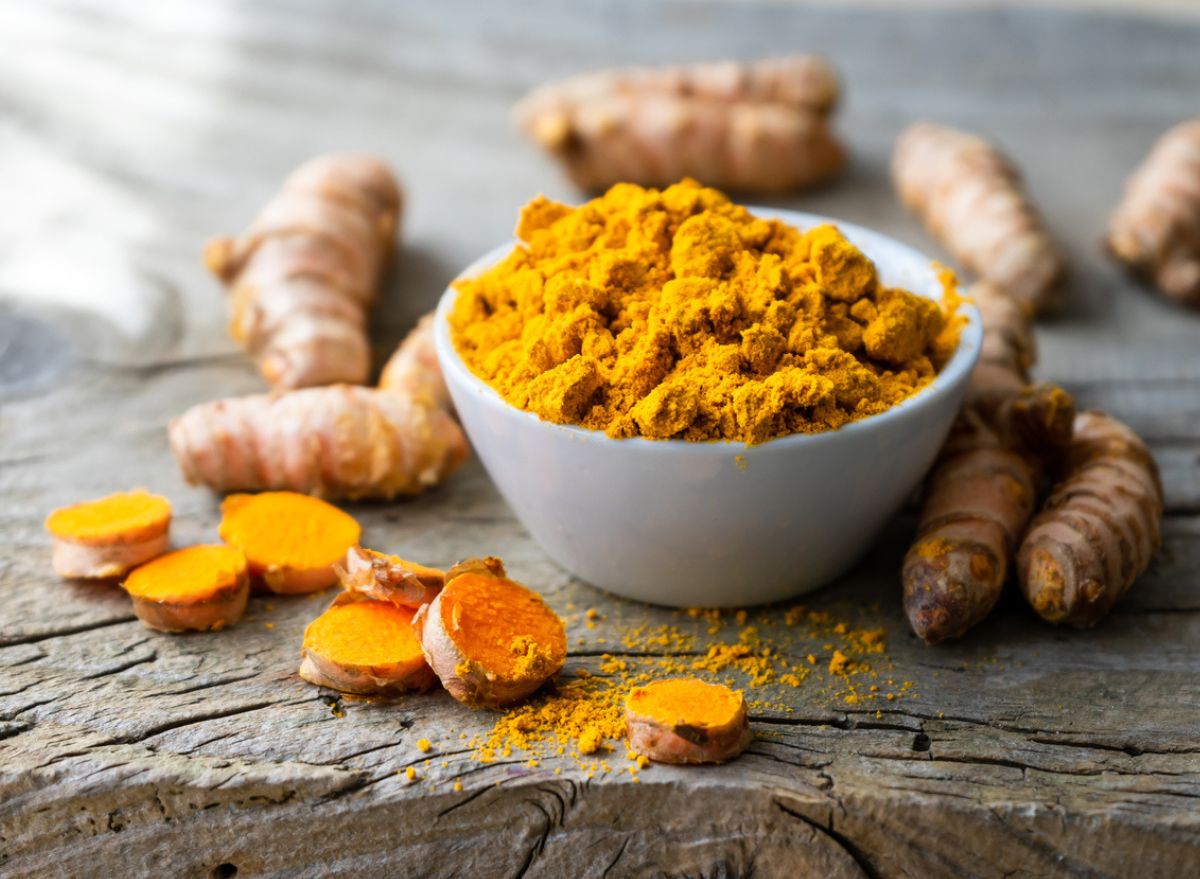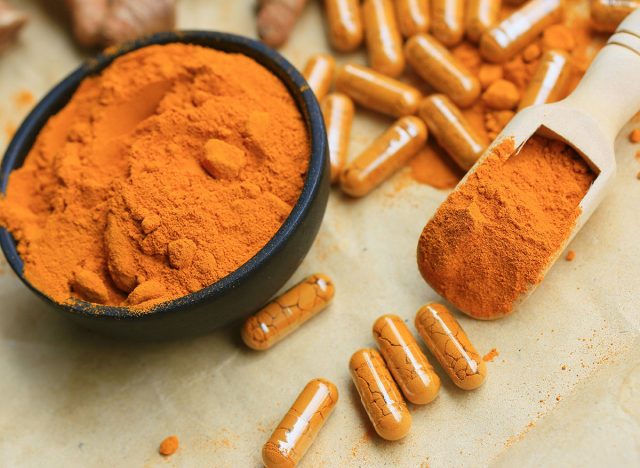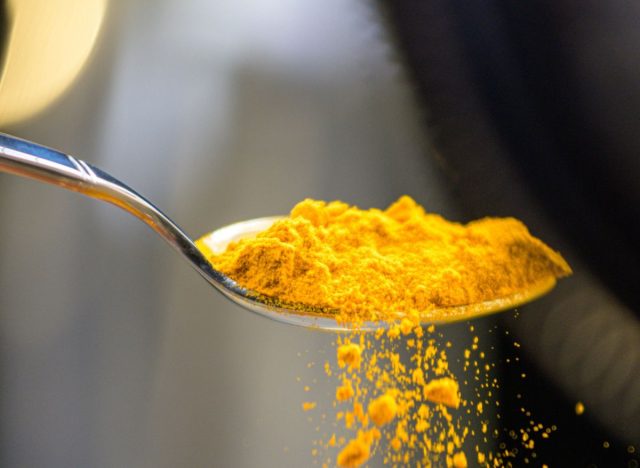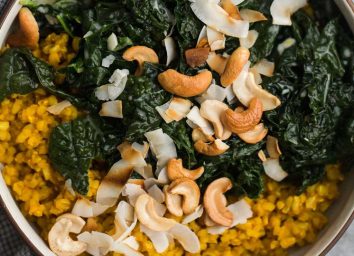5 Science-Backed Benefits of Turmeric

Food isn’t just a delicious way to satisfy cravings, it can also act as medicine in many cases. Different types of fruit, vegetables, legumes, nuts, seeds, spices, and meat products offer their own unique set of vitamins, minerals, antioxidants, and nutrients that can give you a health boost when consumed. One item in particular gets lot of attention for its potential health properties, and this naturally yellow spice is often used in curry-style dishes as the main flavor ingredient. You guessed it, we are talking about turmeric.
This yellow spice is widely known as a way to add flavor to your favorite meals or drinks, or as a supplement to take in capsule form. But what does the research say about turmeric benefits, and are there any downsides to incorporating this ingredient into your daily routine? Read on to find out, and for more healthy eating tips, check out the 72 Unhealthiest Foods on the Planet.
What is turmeric?
Turmeric is in the same plant family as ginger, and the root of turmeric looks very similar to ginger root. According to the National Center for Complimentary and Integrative Health, this plant has been used in the past as Ayurvedic medicine (a traditional practice incorporating holistic medicine) in India and China as an aid for respiratory and joint issues. Now, many people take turmeric supplements to help with many inflammatory issues.
It isn’t just used as a supplement, though. Although it starts in root form, what you’re most likely familiar with is the bright yellow powder that is sold in grocery stores and is used as a spice in many curries. Curcumin, which is a naturally occurring chemical found in turmeric, is what gives this powder its yellow hue, as well as most of its anti-inflammatory properties.
Much of the research that you’ll see about turmeric benefits will commonly discuss the properties of Curcumin as its main component. With that being said, what are some of the health benefits related to this yellow powder?
What are the health benefits of turmeric?

It may have antioxidant properties
If you’re unfamiliar with oxidative stress damage, it is what occurs when you too many free radicals in your body, which are known as unstable atoms in the body that can lead to faster aging and chronic disease. When there are too many of these and not enough antioxidants (which fight off free radicals) in your body, oxidative damage can occur. This is why you hear a lot of praise for foods that are high in antioxidants like berries, vegetables, nuts and seeds, and some fish products.
Antioxidants can also be found in some spices, including turmeric. According to a report published in The Molecular Targets and Therapeutic Uses of Curcumin in Health and Disease, curcumin is considered have antioxidant properties, and therefore is associated with helping to fight free radicals in the body and can even help contribute to the protection against diseases like atherosclerosis, neurodegenerative diseases, and even some cancers.
You may feel less arthritis pain
Knee osteoarthritis is one of the most painful and common age-related joint disorders. A typical first-line treatment is nonsteroidal anti-inflammatory drugs like diclofenac. In a small study in the journal Trials, researchers assigned 139 patients with knee osteoarthritis with either 500 milligrams of curcumin three times a day or a 50-milligram diclofenac tablet twice daily for 28 days. At days 14 and 28, the subjects receiving the turmeric reported a 50% improvement, similar pain relief noted by the subjects taking the prescription drug. Surprisingly, the researchers also noticed that those taking curcumin lost, on average, 2% of their body weight in four weeks.
Turmeric contains compounds that may help boost weight loss
A number of animal studies have suggested that curcumin may aid in weight loss and reduce belly fat. While much more research is needed, some small human studies indicate that bioavailable forms of curcumin supplementation may have a positive effect on body composition. A 2015 study of overweight people who had trouble losing weight on a 30-day diet and lifestyle change program showed that supplementing with 800 milligrams of curcumin for 30 days led to significant reductions in weight, body fat, and hip and waist circumference.
It can help reduce risk of diabetes
Several studies have suggested that there may be a turmeric benefit related to preventing prediabetes and type 2 diabetes, including a 2009 study from the Diabetes and Metabolic Diseases Research Program at Auburn University. This research compared curcumin to the common diabetes medication metformin, and found the anti-inflammatory spice to be even more potent than the prescription drug at lowering blood glucose.
Other research published in 2012 in Diabetes Care tested curcumin supplementation in a group of 240 people with prediabetes. The subjects were randomly assigned to take either curcumin capsules or placebo capsules for nine months. After the test period, more than 16% of the people in the placebo group developed type 2 diabetes compared to none in the curcumin-treated group. Researchers say the study demonstrated that curcumin improves the function of insulin-producing β-cells in the pancreas. Diabetes is a result of the loss or dysfunction of these important cells.
It can have brain-boosting abilities
Research has shown that curcumin can block certain inflammatory stimuli and suppress inflammation. One study in Advances in Nutrition in 2018 concluded that “supplementing the diet with curcumin, an anti-inflammatory polyphenolic compound from the curry spice turmeric, is a potential approach to prevent accelerated cognitive decline by counteracting chronic inflammatory processes.”
Other research indicates that curcumin may protect the brain from toxins—aluminum, in particular. Aluminum is known to impair memory and spatial learning, and this metal can enter the human body through the gastrointestinal tract and lungs through cookware, cosmetics, and pharmaceutical products.
In an animal study published in January 2021 in Biomed Research International, researchers injected aluminum chloride into mice that were given oral doses of turmeric extract and a turmeric extract essential oil. In the study, part of which put the mice through a challenging maze, the turmeric seemed to significantly reverse the cognitive symptoms from the toxic aluminum. What’s more, the turmeric fed to the mice seemed to protect brain cells in the hippocampus from damage.
Are there any downsides to turmeric?

In very few cases, turmeric was found to cause liver damage
One study published in the American Journal of Medicine in October 2022. Over a period of 10 years, researchers found 16 different cases of liver injuries related to turmeric, with one death and five hospitalizations. Because this was 16 cases over a span of 10 years, these incidences are considered to be extremely rare, and more research is certainly needed. However, if you have any concern or liver-related issues, you may want to talk with a doctor before including more turmeric into your daily routine.
What you buy may not always be pure turmeric
Turmeric powder is a great addition to many spicy dishes, as well as a fun way to make a golden latte when you’re trying to skip the coffee. Unfortunately, when we consume turmeric powder, we run the risk of also consuming some unexpected additives like lead or flours like rye, cassava, or wheat.
This is because of a common process known as adulteration, where powdered spices are mixed with other spices, cheaper flours, and sometimes ingredients like lead, to make the production process cheaper. Unfortunately, as consumers, this puts us at risk of ingesting unwanted ingredients, or at the very least, at the risk of wasting our money on what we assume is pure turmeric.
It can possibly lead to stomach pain, but this side effect is rare
While Curcumin gives turmeric powder a ton of potential health benefits, some research suggests that there may be a potential side effect. A study from Cancer Prevention Research showed curcumin to cause diarrhea, bloating, or other digestive problems in a small number of people. This side effect is pretty rare, and most likely isn’t enough reason to stop using turmeric, but it is still possible if you consume larger amounts of turmeric on a regular basis.
How can you incorporate turmeric into your cooking?

Turmeric is a common ingredient in many curry dishes, so trying your hand at a few curry-inspired recipes can be a foolproof way to get more of this spice in your diet. If that’s not your thing, you could also try making a golden milk latte, which is usually made with turmeric, sweetener, and your milk of choice.
But when it comes to getting as many turmeric benefits as possible, whether it’s with supplements or in our food, one significant problem with getting enough of it is that the compound is poorly absorbed, rapidly metabolized, and quickly eliminated. However, there’s another spice that you can add to your curry or golden lattes may negate that issue: black pepper. A review of research in the journal Foods showed that combining piperine, the key active ingredient in black pepper, with curcumin increased bioavailability by 2,000%. So, the next time you replenish your spice rack, grab some turmeric and black pepper, too.
A previous version of this story was published on April 3, 2021. It has been updated to include additional copy and proofreading revisions, additional research, and updated contextual links.
- Source: https://www.nccih.nih.gov/health/turmeric
- Source: https://www.hsph.harvard.edu/nutritionsource/antioxidants/#antioxidants%20in%20food
- Source: https://link.springer.com/chapter/10.1007/978-0-387-46401-5_3
- Source: https://trialsjournal.biomedcentral.com/articles/10.1186/s13063-019-3327-2
- Source: https://pubmed.ncbi.nlm.nih.gov/26592847/
- Source: https://www.ncbi.nlm.nih.gov/pmc/articles/PMC3476912/#B3
- Source: https://www.ncbi.nlm.nih.gov/pmc/articles/PMC2637808/
- Source: https://www.hindawi.com/journals/bmri/2021/6645720/
- Source: https://pubmed.ncbi.nlm.nih.gov/36252717/
- Source: https://downloads.hindawi.com/journals/jeph/2014/730636.pdf
- Source: https://pubmed.ncbi.nlm.nih.gov/25853978/
- Source: https://updatepublishing.com/journal/index.php/josac/article/view/6072
- Source: https://cancerpreventionresearch.aacrjournals.org/content/4/3/354
- Source: https://pubmed.ncbi.nlm.nih.gov/29065496/









